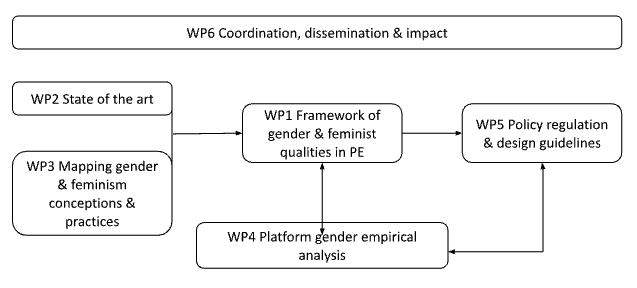What is Digital Gender?
The project “Gender equality qualities of the platform economy. A framework of analysis” (Digital Gender) (concession nr. PID2020-115065RB-I00) is a R+D+i Project funded by the Ministry of Science and Innovation of the Government of Spain. It has been funded under the call “R+D+i Projects within the framework of state programs for the generation of knowledge and scientific and technological strengthening of the R+D+i system and R+D+i oriented to the challenges of society. Call 2020.”
The execution period of the project is September 1, 2021-August 31, 2024.
Who is part of Digital Gender?
Principal Investigator

Mayo Fuster Morell
Research team

Ricard Espelt Rodrigo

Claudia Margarita Malpica Lander
Senior work team

Nuria Reguero Jimenez

Enric Senabre Hidalgo

Mónica Grau Sarabia

Susana María Galán Julve
Junior work team

Núria Vega Rodriguez

Vera Vidal Rougier

Sara Moreira

Adria Garcia Mateu

Melissa Renau Cano

Thais Ruiz de Alda de la Rosa
Organisational support and research assistance

Julia Macarulla Mackay
Data analysis and result dissemination

Carlos Guadián Orta
What is Digital Gender about?
Context
New technologies have prompted a transition from the factory as the reference unit of production in the industrial economy of the 20th century to digital platforms as the reference in the digital economy of the 21st century. The platform economy (PE) refers to the collaborative production, consumption, and distribution of work and capital among disseminated groups of people supported by digital platforms. The COVID-19 pandemic has accelerated the expansion of the digitalisation and platformisation of the economy and exacerbated the care crisis as a result of the generalisation of telework and increased care responsibilities. These aspects underline the urgency of studying gender dynamics within the PE. However, research on gender and the PE is still scarce, and thus needs to be reinforced.
Objectives
The project aims to develop a framework of analysis of the gender equality qualities of the platform economy from an intersectional gender perspective. It pays special attention to how the interrelation and overlapping of social categories such as gender, race, age, and class are creating systems of oppression and discrimination in the context of the PE. The framework will bridge the gap between feminist theory, feminist economy, social economy, and platform economy studies.
The project addresses these research questions:
- How does the PE perform in terms of gender from an intersectional perspective?
- Is there a diverse impact depending on PE models (in terms of governance models, economic models, and technological and data dimensions)?
- How far regulations and policy in the PE have considered gender and could favour gender equality?
Organisation of the project
This project is organised in six Working Packages:

The project is developed as part of the Barcelona UOC Chair in Digital Economy, a collaboration between UOC, the Barcelona City Council and Barcelona Activa, and of the Sharing Cities Action program with the involvement of 50 cities around the world.

REFERENCIA DEL PROYECTO AEI/10.13039/501100011033